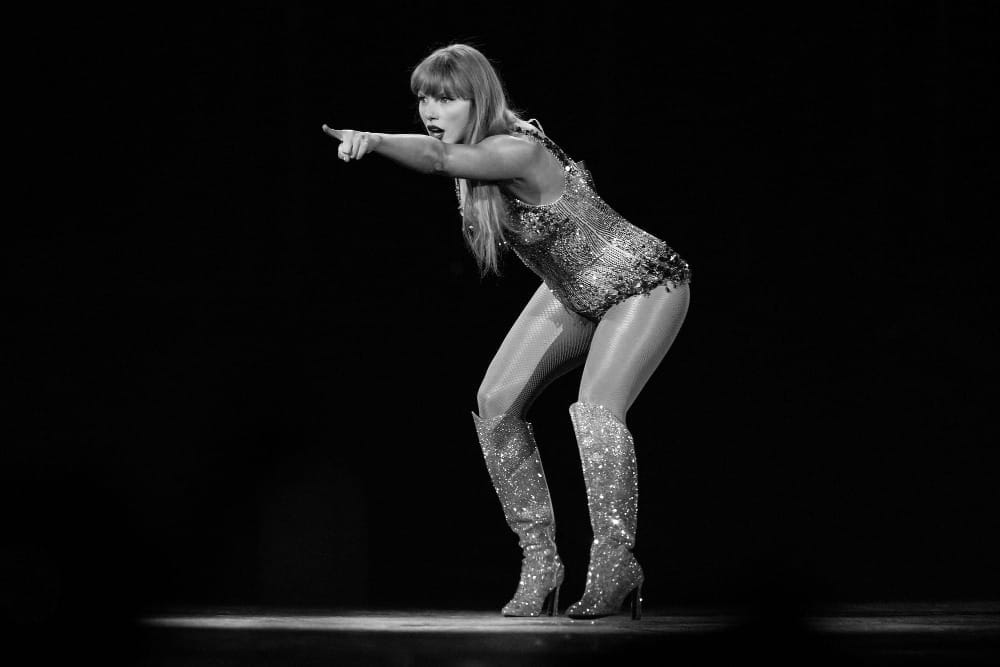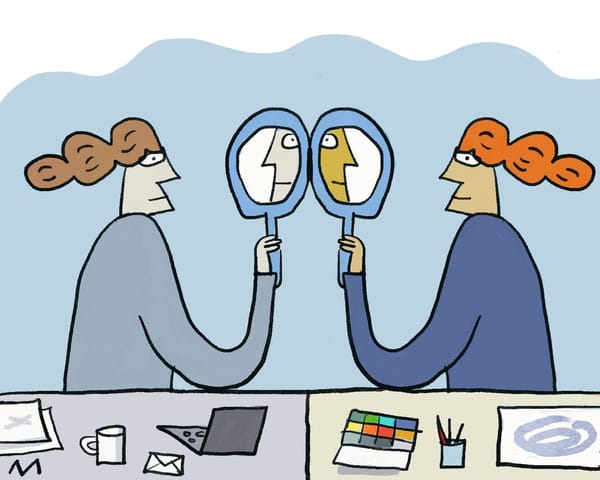I’ll Never Break Up With a Breakup Album
The breakup song is the ultimate declaration of independence and rediscovery—a tribute to the complexity of womanhood.

“I now know what Swifties feel like,” a friend recently texted me. He’d just devoured Lily Allen’s new album “West End Girl,” an unvarnished tell-all about the end of her marriage to the actor David Harbour and—practically frothing at the mouth—was urging me to drop everything and do the same.
I’ve always found Lily Allen, the bold British singer-songwriter, to be deliciously funny and lyrically brilliant in her unpretentious vulnerability, a technicolor riot of wit and indignation. When her 2008 album, “It’s Not Me, It’s You” was released, one critic praised Allen for leaving no taboo untouched.
Allen was holding up a manicured middle finger to the industry’s sanitized femininity—to the cute Spice Girls-and-Britney Spears image of what a woman pop star should be.
So yes, at my friend’s urging, I tuned in. And as soon as I did, I realized that I wasn’t just listening to 14 synth-laced, electronica-inspired songs, testament to the creative maturing of one of the U.K.’s most experimental musicians; I was also listening to a narrative masterpiece, a no-holds-barred memoir of sorts, and perhaps the most raw breakup album I’d ever heard.
Indeed, “West End Girl” is not only an account of marital dissolution, but a reminder of what women in the music industry have been doing for generations: re-writing the scripts of their romances exactly how they want. Screw the critics. This is liberation.
A Declaration of Independence
As long as they’ve existed, breakup songs and albums have been written off by some critics as emotional indulgences; as sonic equivalents of tear-stained diaries; a place for women to bawl their eyes out, to wallow and to work it out in that, you know, female way. But they're something much more radical than that. They’re a space where artists have redefined themselves, reclaimed creative control, and reimagined what power and vulnerability can sound like.
Even if I reflect on the soundtrack to my own life so far—the snarling catharsis of my teenage (and, let’s be real, enduring) Alanis Morissette phase, those college-era loops of Janis Joplin (“Piece of My Heart”) and Dolly Parton (“Jolene”) and Whitney Houston (“I Have Nothing”), a recent dalliance with Taylor Swift, and the gentle hum of Joni Mitchell throughout—the evidence is there. The breakup album is not just about breaking up; it’s a declaration of independence and rediscovery.
Men have, of course, contributed to the breakup genre in a meaningful way—Phil Collins, Boyz II Men, Luther Vandross and Bon Jovi, to name a few—but women have led the charge. They’ve delivered a broader spectrum of emotions and feelings through their music, resulting in a collective body of work that’s emotionally honest and kaleidoscopic.
Much of the breakup music by women artists has nuance and duality. It has both anger and grace, and because of this, it is one of the most useful art forms for understanding women in all of our complicated glory.
‘Alive, Alive!’
It's impossible to determine who exactly is the mother of the modern breakup album. A shortlist would certainly have to include Aretha Franklin. “You're a no good heartbreaker. You're a liar and you're a cheat. And I don't know why, I let you do these things to me,” she lamented in her 1967 hit, “I Never Loved a Man.” Gloria Gaynor’s “I Will Survive” remains a cultural touchstone that has transcended generations—a timeless feminist and queer empowerment anthem of defiance and revival.
It would also have to include Joni Mitchell. Her 1971 album “Blue” is so raw, so piercing, and so intimate that it should be mandatory listening for anyone claiming to be in touch with their own humanity.
“It is the story of a restless young woman questioning everything—love, sex, happiness, independence, drugs, America, idealism, motherhood, rock ’n’ roll,” the New York Times music critic Lindsay Zoladz wrote in an article marking the album’s 50th anniversary in 2021, describing it also as “a holistic balm for the rawest kind of heartbreak.”
But it’s not all sad. It’s also reinvigorating and carefree. “Alive, alive, I wanna get up and jive,” Mitchell sings in the song “All I Want.” “I wanna wreck my stockings in some jukebox dive.” The album is about authenticity and candor, and it arrived at a moment when emotional transparency in women was still dangerous. Mitchell went there.
Then, of course, there were the 1990s. Countless breakups were privately mourned with Sinead O’Connor’s otherworldly rendition of Prince’s “Nothing Compares 2 U.” (O’Connor later said the song made her think of her mother who had died in a car accident, but the breakup motif is undoubtedly present.) Natalie Imbruglia writhed around to “Torn,” Gwen Stefani belted out “Don’t Speak” and Toni Braxton soared her way through “Unbreak My Heart.” Lauryn Hill and, lest we forget, Mariah Carey made their indelible marks, too. We were treated to a veritable kaleidoscope (there's that word again!) of breakup songs that reminded us that no relationship ever ends the same way. Everything is exceptional. Everything is normal. We’re all crazy.
That was also the era of the great R&B breakup album. When Whitney Houston in 1998 sang “It’s Not Right But It’s Okay” she was paying homage to the push-and-pull of expectation versus reality. She was bringing to life the utter idiocy of the cheating boyfriend. A betrayed woman, she intones, doesn’t actually have to be heartbroken, she can just be mad as hell: “Close the door behind you, leave your key,” she ordered. And then the zinger realization that might’ve saved any number of women all the energy and agony in the world: “I'd rather be alone than unhappy.”
Mary J. Blige, meanwhile, more explicitly reframed the breakup not as a tragedy but as a transformation. “So tired—tired of all this drama,” she sang in the very first line of her aptly named 2001 hit, “No More Drama.” Sure, there’s sadness in the lyrics, but there’s also an undeniable decisiveness. “It's up to us to choose whether we win or lose,” she asserts. “And I choose to win.”
All these albums and songs are not just dwelling on romance gone awry, they’re therapy and purging; they’re busting the ridiculous stereotype of how a recently single woman should be and, as such, they are rebellions that serve us all.

Her Prerogative
For all of paradigm-shifting breakup songs and albums of decades past, the art form has thrived in the contemporary era, too. Take Adele’s album “21” from 2011, for example. On it, she cycled through crushing sadness, rage, mocking and some delightfully patronizing moments. “Bless your soul, you've got your head in the clouds,” Adele crooned in “Rumour Has It.” “She made your heart melt, but you're cold to the core. Now rumour has it, she ain't got your love anymore.”
Around the same time, Florence Welch in “Shake It Out” delivered the ultimate ode to regret. And there was Amy Winehouse’s “Back to Black,” the lyrics of which took on tragic subtext when she died by suicide just five years after its release.
But “Dancing on My Own” will forever be one of my favorite breakup tracks of that decade. The beat is irresistible. Far from the empowering anthems of the previous decade, Robyn chronicled the pathetic state we can get ourselves into when we’re just totally devastated; entirely torn apart. “I’m all messed up” and “I’m so out of line,” the Swedish singer admitted, and no, she’s clearly not yet entered the empowerment stage and no, she’s not sorry about it. She wants to mope and cry and dance on her own and that, quite frankly, is her prerogative.
Then, in 2016, Beyoncé roared into the canon of genre-defining breakup albums with “Lemonade.” Who can forget Becky with the good hair? Add to that, Ariana Grande’s “Thank U, Next;” Demi Lovato’s “Sorry Not Sorry;” “It’s Ok I’m Ok” by Tate McRae. The list goes on.
Which brings us, inevitably, to Taylor Swift. If Alanis Morissette, Joni Mitchell, Whitney Houston and Mary J. Blige defined what the genre of the breakup song could be, then Swift turned it into a serialized autobiography. Each of her albums revisits her romantic past not as a diary but as a manifesto of authorship. In fact, by re-recording her old records, she went so far as to literalize the metaphor at the heart of the breakup album. She took back ownership of her own story.

Beyond Taylor
The beauty of all these albums, of course, is that it almost does them a disservice to speak about them in the same breath. What unites them isn’t sound, style, or mood; it’s the act of reclamation and rebellion. For Gloria Gaynor in 1978, it was crying out to the world that as long as she knows how to love she knows she’ll stay alive. For Lily Allen in 2025, it’s airing all of her ex-husband’s dirty laundry in snarky rhyming couplets.
It might not always look dignified or convenient, but it’s real life. It's heartbreak that sits right next to triumph, it's defiance that reclaims autonomy, and yes sometimes it's hope. Because breakups may be the end of something, but they are also the beginning of something else.
Next Up. 🎧
Please enjoy The Persistent's very own breakup album playlist. (Listen now on Spotify.)
2. Janis Joplin - Piece of My Heart
3. Dolly Parton - Jolene
4. Joni Mitchell - All I Want
5. Fleetwood Mac - Go Your Own Way
6. Gloria Gaynor - I Will Survive
7. Sinead O’Connor - Nothing Compares 2 U
8. Alanis Morissette - You Oughta Know
9. Natalie Imbruglia - Torn
10. Whitney Houston - It’s Not Right But It’s OK
11. Mary J. Blige - No More Drama
12. Beyoncé - Irreplaceable
13. Amy Winehouse - Back to Black
14. Florence and the Machine - Shake It Out
15. Robyn - Dancing on My Own
16. Taylor Swift - All Too Well
17. Demi Lovato - Sorry Not Sorry
18. Ariana Grande - Thank U, Next
19. Tate McRae - It’s Ok I’m Ok
20. Lily Allen - Madeline







